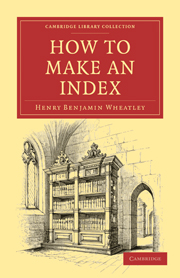CHAPTER VIII - GENERAL OR UNIVERSAL INDEX
Published online by Cambridge University Press: 05 February 2012
Summary
“When Baillet, the learned author of the Jugemens des Savans, was appointed by M. de Lamoignon keeper of the exquisite library collected by that nobleman, he set to work to compile an index of the contents of all the books contained in it, and this he is said to have completed in August, 1682. After this date, however, the Index continued to grow, and it extended to thirty-two folio volumes, all written by Baillet's own hand.”
AS knowledge increases and books and magazines gather in number, the need for many indexes becomes daily more evident. We often are certain that something has been written on a subject in which we are interested, but in vain we seek for a clue to it. We want a key to all this ever-increasing literature.
As long ago as 1842 the late Thomas Watts, of the British Museum, one of the most learned and all-knowing of librarians, spoke to the late Dr. Greenhill of Hastings on the need for the formation of an Index Society. This date I give on the authority of Dr. Greenhill. Mr. Watts was a perfect index in himself, and few inquirers sought information from him which his fully stored mind was not able to supply; and he was not jealous of the printed index, as some authorities are. Twelve years after—in 1854—an announcement was made in Notes and Queries of the projected formation of a “Society for the Formation of a General Literary Index.”
- Type
- Chapter
- Information
- How to Make an Index , pp. 206 - 224Publisher: Cambridge University PressPrint publication year: 2010First published in: 1902



